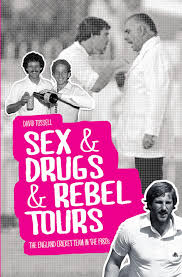Sex & Drugs & Rebel Tours
Martin Chandler |Published: 2015
Author: Tossell, David
Publisher: Pitch Publishing
Rating: 3.5 stars

Cricket literature got on just fine for well over a century without a book like this, and then we get three in four years. So do I criticise David Tossell for bandwagon jumping, or praise him for exploiting a clever and original idea? The first book along these lines was Guy Fraser-Sampson’s Cricket at the Crossroads, which appeared in 2011, a look at England’s fortunes over the period 1967-1977. The following year Tim Quelch’s Bent Arms and Dodgy Wickets did the same for the 1950s. Both books were primarily the story of England’s Test cricket over the period, but had more than a sprinkling of social history. Both were very well received in my corner of the CW Review Team.
It was far from plain sailing all the way for England in those eras, but Fraser-Sampson had good wins in West Indies and Australia to deal with, and Quelch’s era included the mid 1950s, a time when England were as strong as they ever have been. David Tossell has chosen the 1980s for Sex and Drugs and Rebel Tours. He does have three Ashes wins to deal with, including the remarkable summer of 1981, but by and large these were not good years for the English game, and despite those successes over the old enemy the book begins and ends with two harrowing defeats at the hands of the Oz.
Tossell starts with the hurriedly arranged three Test series which marked the outbreak of peace between Kerry Packer and the ACB. In a far sighted move the MCC decided the Ashes, which had been at stake when Mike Brearley’s side hammered the Australian third eleven in 1978/79 by five Tests to one, wouldn’t be put up for grabs in a series against the firsts. Perhaps that made the Aussies all the keener, and of course their three nil baggygreenwash would have done perfectly well to take a five Test series. Sex and Drugs and Rebel Tours tells me the story of the matches, of course, but more importantly reminds me of the talking points, not all of which I suspect I took on board at the time. The tour began with Brearley growing his ‘Ayatollah’ beard and, inevitably perhaps, with Geoffrey Boycott being a pain in the arse.
The final chapter chronicles the awful summer of 1989 when Allan Border’s side steamrollered England in a way that was even more disappointing than the by then routine drubbings we suffered at the hands of the West Indies. I hadn’t forgotten, and didn’t need to be reminded of, the mountain of runs Stephen Waugh scored. It always strikes me as odd that the abiding memory most Englishmen have of the tour is Waugh’s batting, and how easily we all forget that Mark Taylor in fact scored even more heavily. In terms of looking back the most interesting aspect of the closing pages of Sex and Drugs and Rebel Tours is the ruffling of the feathers of England skipper David Gower and Chairman of selectors Ted Dexter. Watching Gower anchor the Sky commentary team, so laid back he is all but horizontal, it is easy to forget there were occasions in the past when the pressure of leading a poor England side got to him.
Before that final indignity against the oldest enemy there had been the odd success, but generally it was grim stuff, and there were home defeats by India, Pakistan and New Zealand as well as the expected defeats at the hands of the men from the Caribbean. Looking back it really was a case of the selectors and players at times looking absolutely clueless.
There is a difference between Tossell’s book on the one hand and those of Fraser-Sampson and, particularly, Quelch on the other, that being the amount of social history that is included. There is rather less in the way of reminders of what was going on in the wider world in Sex and Drugs and Rebel Tours, but then Tossell didn’t have to go too far beyond the players themselves to find his non-cricketing material. There was the determination, as the decade wore on, of the tabloid press to expose misbehaviour on the part of the once talismanic Ian Botham, and the book is a salutary reminder of how the great all-rounder, despite the magnificent record he nonetheless has, was such a disappointment for so long. Mike Gatting too kept the press pack on their toes, with his confrontation with Shakoor Rana in Pakistan, and the dalliance with a barmaid that was the final nail in the coffin of his captaincy the following summer.
To answer the question I asked in the opening paragraph of this review Sex and Drugs and Rebel Tours is certainly a case of making the most of a good idea, and in a masochistic sort of way I did enjoy being reminded of the cricketing disappointments of a period I have tended to regard, for all other purposes, as the best years of my life. I would have liked a bit more biting social comment, and for someone else to recognise that Margaret Thatcher, being the cause of everything else that went wrong in 1980s, was also responsible for the shortcomings of our Test cricketers, but I suppose it must remain a possibility that David Tossell wouldn’t agree with me on that one.






Leave a comment